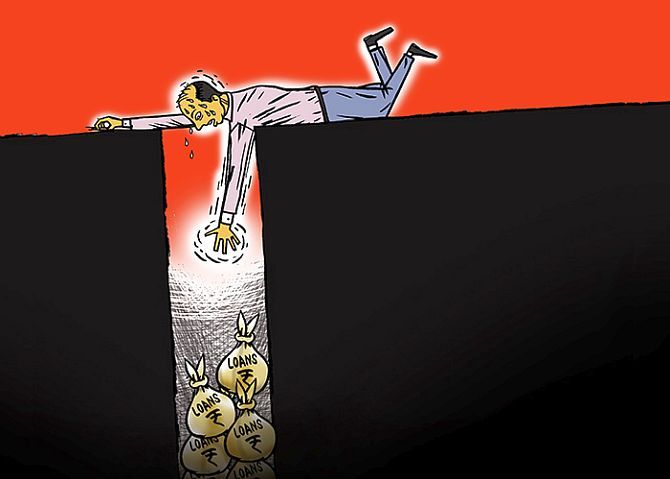Traditionally, most PSUs have been cash-rich, which added to their value. However, the government has been tapping regularly into their cash resources to boost revenue for the exchequer
Illustration: Dominic Xavier/Rediff.com

Public sector enterprises are back on the government’s radar after it was learnt that the Ministry of Finance’s Department of Investment and Public Asset Management (DIPAM) has been examining plans to launch three equity exchange-traded funds (ETFs) in the current fiscal year after the formation of the new government.
The DIPAM expects that the three ETFs will be attractive to investors who want to put in money in specific sectors, and will help the Centre meet an ambitious Rs 90,000-crore divestment target for FY20.
A quick check on the performance of public sector enterprises at the bourses under the past two governments -- the second tenure of the United Progressive Alliance (2009–2014) and Narendra Modi – led National Democratic Alliance (NDA; 2014 onwards) -- reveals that most of these stocks have lost ground.
While the S&P BSE Sensex gained nearly 42 per cent under the UPA II, stocks of state-owned companies such as MMTC, Hindustan Copper, NMDC, SAIL, BHEL, National Aluminium Company (Nalco), Bank of India, Indian Overseas Bank (IOB) and BEML slipped around 50 per cent to 97 per cent during this period, ACE Equity data shows.
Banking stocks such as that of IOB, UCO Bank, Syndicate Bank, Andhra Bank, Oriental Bank of Commerce, Bank of India, and Bank of Maharashtra were the top PSU losers under the NDA’s rule.
While the S&P BSE Sensex gained nearly 44 per cent under the NDA government, these stocks lost 73 per cent to 86 per cent during this period, data shows.
ONGC, BHEL, Punjab National Bank, Hindustan Copper, SAIL and Coal India were some of the other losers.
So, should you stay away from the PSU basket?
Though analysts expect the markets to do well, excessive government control and asset quality concerns in some are among the factors that deter investors from putting money in these companies, they say.
“There are chances that Life Insurance Corporation of India (LIC) and other insurers will buy into the ETFs as and when they are launched. PSUs have been one of the most underperforming stocks and investors have lost money here.
"Whichever government comes to power, it will have to manage the fiscal situation and will be forced to mobilise money via such routes.
"One cannot expect much retail investor interest in such offerings,” explains G Chokkalingam, founder and managing director at Equinomics Research.
Traditionally, most PSUs have been cash-rich, which added to their value.
However, the government has been tapping regularly into their cash resources to boost revenue for the exchequer.
Experts believe the high amount of cash PSUs gave investors through dividends and buybacks could hold back capex growth of these companies.












 © 2025
© 2025